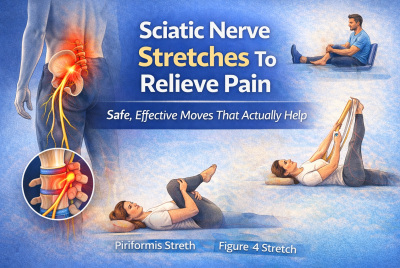Arthritis and Sciatica
Discover effective ways to manage arthritis and sciatica symptoms. Learn about prevention, treatments, and holistic approaches for relief. Dive in now! Arthritis and sciatica are two common conditions that affect millions of people worldwide. As someone passionate about sciatica health and eager to provide helpful suggestions, I understand the importance of finding effective strategies to alleviate pain and improve mobility. In this article, I’ll share insights and tips on how to manage these conditions effectively, drawing from personal experiences and expert advice.
Introduction to Arthritis and Sciatica
Arthritis is a condition characterized by inflammation of the joints, leading to pain, stiffness, and reduced mobility. On the other hand, sciatica is a type of nerve pain that radiates along the sciatic nerve, often causing discomfort in the lower back, buttocks, and legs. While these conditions differ in their causes and symptoms, they can both significantly impact one’s quality of life.
Understanding Arthritis
Arthritis encompasses a range of conditions, including osteoarthritis, rheumatoid arthritis, and psoriatic arthritis. Each type has its own set of symptoms and underlying causes, such as genetics, injury, or autoimmune factors. Common symptoms of arthritis include joint pain, swelling, and stiffness, which can vary in severity depending on the individual.
Understanding Sciatica
Sciatica is caused by compression or irritation of the sciatic nerve, which extends from the lower back to the legs. Various factors can cause sciatica, such as a herniated disc, spinal stenosis, or muscle tightness. Symptoms of sciatica often include sharp pain, numbness, tingling, or weakness along the nerve pathway.
Connection between Arthritis and Sciatica
Interestingly, arthritis can exacerbate sciatica symptoms due to joint inflammation and structural changes in the spine. Those with arthritis, especially in the spine or hips, are at a higher risk of developing sciatica. Understanding this connection is crucial for effective management.
Managing Arthritis and Sciatica
Effective management of arthritis and sciatica involves a combination of lifestyle modifications, medical treatments, and therapies. For arthritis, maintaining a healthy weight, staying active, and using assistive devices can help reduce pain and improve joint function. Similarly, for sciatica, stretching exercises, hot/cold therapy, and proper posture can provide relief from symptoms.
Diet and Nutrition for Arthritis and Sciatica
A balanced diet rich in anti-inflammatory foods, such as fruits, vegetables, and omega-3 fatty acids, can help reduce inflammation and alleviate the symptoms. Conversely, processed foods, refined sugars, and excessive alcohol consumption may exacerbate inflammation and worsen the pain.
Natural Remedies and Supplements
Several herbs and supplements have shown promise in alleviating joint pain and inflammation associated with arthritis and sciatica. Turmeric, ginger, and fish oil are among the most widely studied natural remedies for their anti-inflammatory properties. However, it’s essential to consult with a healthcare professional before incorporating any new supplements into your regimen.
Mind-Body Practices
Stress management techniques, such as deep breathing exercises, meditation, and yoga or pilates, can help alleviate both physical and emotional symptoms of arthritis and sciatica. By reducing stress levels, individuals may experience improvements in pain perception and overall well-being.
Preventing Arthritis and Sciatica
While arthritis and sciatica may not be entirely preventable, certain lifestyle habits can help reduce the risk of developing these conditions or alleviate their severity. Maintaining a healthy weight, practicing good posture, and avoiding repetitive movements that strain the joints or spine are essential preventive measures.
Support Systems and Communities
Finding a sense of belonging within support systems and communities can be immensely comforting for individuals navigating arthritis and sciatica. Online forums, local support groups, and close friends and family can offer empathy, understanding, and practical advice.
Staying Positive and Motivated
Maintaining a positive outlook amidst the challenges is critical to resilience. Setting realistic goals, focusing on progress rather than setbacks, and practicing gratitude can foster a sense of empowerment and motivation.
Celebrating Progress and Success
Finally, celebrating even the smallest victories along the journey to managing the pain is essential. Whether it’s being able to take a short walk without discomfort or achieving better pain management, every milestone deserves recognition and celebration.
My Personal Experience
As someone passionate about sciatica health and eager to provide helpful suggestions, I’ve learned firsthand the importance of patience, perseverance, and self-care. While there may be days when the pain feels overwhelming, there are also moments of triumph and progress. By staying informed, staying active, and staying connected, it’s possible to live a fulfilling life despite the challenges of arthritis and sciatica.
Frequently Asked Questions (FAQs)
Can arthritis lead to sciatica?
While arthritis itself does not directly cause sciatica, certain types of arthritis, such as osteoarthritis or spinal arthritis, can contribute to conditions like spinal stenosis or herniated discs, which may lead to sciatic nerve compression.
What are the best exercises for relieving sciatica pain?
Gentle stretching exercises, such as hamstring stretches and piriformis stretches, can help alleviate sciatica pain by relieving pressure on the sciatic nerve. Low-impact activities like swimming or walking may also be beneficial.
Is there a specific diet that can alleviate symptoms of arthritis?
A diet rich in anti-inflammatory foods, such as leafy greens, berries, and fatty fish, may help reduce inflammation and alleviate symptoms of arthritis. Avoiding processed foods and sugary drinks can also support joint health.
Are there any natural supplements that can help with both arthritis and sciatica?
Certain supplements, such as glucosamine, chondroitin, and methylsulfonylmethane (MSM), have been studied for their potential benefits in managing joint pain associated with arthritis and sciatica. Additionally, natural blends and herbs like turmeric and ginger are known for their anti-inflammatory properties and may offer relief from pain and discomfort. However, consulting with a healthcare professional before starting any new supplements is essential, as they may interact with other medications or conditions.
How important is it to consult a healthcare professional for managing arthritis and sciatica?
Consulting with a healthcare professional is crucial for accurately diagnosing and effectively managing arthritis and sciatica. They can provide personalized treatment plans, recommend appropriate therapies, and monitor your progress over time. Additionally, they can help address any underlying health concerns and prevent complications associated with these conditions.
Arthritis and Sciatica – Conclusion
In conclusion, arthritis and sciatica are complex conditions requiring a multifaceted management approach. By incorporating healthy lifestyle habits, seeking appropriate medical care, and finding support from others, individuals can effectively manage their symptoms and improve their quality of life. Remember, you’re not alone on this journey, and there are resources available to help you every step of the way.
By staying informed, proactive, and engaged in your healthcare journey, you can effectively manage arthritis and sciatica and improve your overall quality of life. Remember to listen to your body, prioritize self-care, and seek support from healthcare professionals and loved ones when needed. With the right strategies and resources in place, you can thrive despite the challenges posed by arthritis and sciatica.
Disclaimer
This article is for informational purposes only and is not a substitute for professional medical advice, diagnosis, or treatment. Always consult with your healthcare provider before starting a new exercise or stretching routine, especially if you have existing back or nerve conditions.
👉 Explore more:





